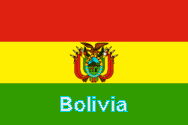Politically-motivated clashes leave 3 dead, 12 injured in Bolivia
 La Paz - Three people died and at least 12 were injured Thursday in clashes between peasants loyal to Bolivian President Evo Morales and supporters of the opposition governor in Pando province.
La Paz - Three people died and at least 12 were injured Thursday in clashes between peasants loyal to Bolivian President Evo Morales and supporters of the opposition governor in Pando province.
The long-standing conflict between the leftist president Morales and five eastern, opposition-controlled provinces over regional autonomy had escalated in previous days.
The incident happened in the town of Tres Barrancas, in the Amazonian jungle, some 1,200 kilometres north of La Paz, Bolivian media reported citing the authorities.
"The peasants were ambushed by supporters of Governor Leopoldo Fernandez at Tres Barrancas. They were coming in to take part in a peasant rally to back Evo Morales,"Nancy Texeira, the president's representative in the province of Pando, told the radio station Fides.
Fernandez, along with the governors of the provinces of Santa Cruz, Beni, Tarija and Chuquisaca, has demanded more autonomy for the country's provinces and the restitution of funds raised by an oil tax that Morales intends to use to provide a universal pension to people over 60.
On Wednesday, Morales ordered US Ambassador Philip Goldberg out of the country, accusing the diplomat of supporting the opposition and their separtist aims.
"I declare the ambassador of the United States persona non grata," Morales said on Bolivian television.
US State Department spokesman Sean McCormack said the charges were "baseless" and that the expulsion was "unwarranted."
Supporters of the pro-autonomy movement Wednesday overpowered police and soldiers protecting a regional tax office in Santa Cruz, a city 900 kilometres east of La Paz.
Police officers were beaten by the mob, national media said. Similar developments were reported from the opposition-controlled regions of Tarija, Beni and Pando.
The mob in Santa Cruz looted the offices of the state-run ENTEL telephone company and Television Boliviana, making off with equipment, while vandals in the streets set fire to office furniture and a vehicle.
Opposition supporters also interrupted gas pipelines to Brazil, Argentina and the western regions of Bolivia, overpowering security and turning off supply. One pipeline to Brazil was destroyed in a bombing.
Cabinet head Alfredo Rada called the events the "start of a civilian coup against democracy." In a rally in La Paz, Morales supporters demanded stronger government action against violent opposition movements.
Coca farmers, who traditionally back Morales, set up roadblocks to interrupt supply to the opposition-controlled regions, which have been protesting for the past two weeks against the national government's use of taxes from national gas production to provide pensions for all Bolivians over 60.
A major factor behind the conflict between the wealthy descendants of European immigrants and the country's impoverished indigenous majority, led by Morales, are the government's attempts to redistribute wealth.
The Bolivian opposition has turned the pro-autonomy movement in several of the country's regions into a tool to attack the government.
Since the beginning of the year, citizens in four provinces have approved referenda by large margins for greater autonomy from the national government, which would grant them control over key natural resources, including natural gas.
The government's opponents accused Morales, who was elected in 2005 as the country's first indigenous president, of carrying out discrimination in favour of indigenous people.
In August, Morales survived a recall referendum with some 67 per cent of the votes in favour of him staying.
Bolivia has a population of 10 million. Around 60 per cent live in poverty, most of them Indios. (dpa)